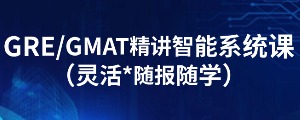选课中心
7099人选课
GMAT公开讲座
0元
GRE公开讲座
0元
一对一体验课
99元
GMAT模考网站
10000人
GRE模考网站
GMAT课程
GRE课程
托福辅导课程
【定制】1v1
私人订制
资料下载
考前冲刺

扫码添加助教
免费领取
备考资料大礼包

扫码关注公众号
新东方在线GMAT频道为大家带来GMAT阅读文章练习二,希望对大家GMAT备考有所帮助。更多精彩尽请关注新东方在线GMAT频道!
Woodrow Wilson was referring to the liberal idea of the economic market when he said that the free enterprise system is the most efficient economic system. Maximum freedom means maximum productiveness; our “openness” is to be the measure of our stability. Fascination with this ideal has made Americans defy the “Old World” categories of settled possessiveness versus unsettling deprivation, the cupidity of retention versus the cupidity of seizure, a “status quo” defended or attacked. The United States, it was believed, had no status quo ante. Our only “station” was the turning of a stationary wheel, spinning faster and faster. We did not base our system on property but opportunity—which meant we based it not on stability but on mobility. The more things changed, that is, the more rapidly the wheel turned, the steadier we would be. The conventional picture of class politics is composed of the Haves, who want a stability to keep what they have, and the Have-Nots, who want a touch of (a touch of: 有一点) instability and change in which to scramble for (scramble for: v.争夺, 勉强拼凑) the things they have not. But Americans imagined a condition in which speculators, self-makers, runners are always using the new opportunities given by our land. These economic leaders (front-runners) would thus be mainly agents of change. The nonstarters were considered the ones who wanted stability, a strong referee to give them some position in the race, a regulative hand to calm manic speculation; an authority that can call things to a halt, begin things again from compensatorily staggered “starting lines.”
“Reform” in America has been sterile because it can imagine no change except through the extension of this metaphor of a race, wider inclusion of competitors, “a piece of the action,” as it were, for the disenfranchised. There is no attempt to call off the race. Since our only stability is change, America seems not to honor the quiet work that achieves social interdependence and stability. There is, in our legends, no heroism of the office clerk (office clerk: n.职员), no stable industrial work force of the people who actually make the system work. There is no pride in being an employee (Wilson asked for a return to the time when everyone was an employer). There has been no boasting about our social workers—they are merely signs of the system’s failure, of opportunity denied or not taken, of things to be eliminated. We have no pride in our growing interdependence, in the fact that our system can serve others, that we are able to help those in need; empty boasts from the past make us ashamed of our present achievements, make us try to forget or deny them, move away from them. There is no honor but in the Wonderland (wonderland: n.仙境, 奇境) race we must all run, all trying to win, none winning in the end (for there is no end).
1. The primary purpose of the passage is to
(A) criticize the inflexibility of American economic mythology
(B) contrast “Old World” and “New World” economic ideologies
(C) challenge the integrity of traditional political leaders
(D) champion those Americans whom the author deems to be neglected
(E) suggest a substitute for the traditional metaphor of a race
2. According to the passage, “Old World” values were based on
(A) ability
(B) property
(C) family connections
(D) guild hierarchies
(E) education
3. In the context of the author’s discussion of regulating change, which of the following could be most probably regarded as a “strong referee” (line 30) in the United States?
(A) A school principal
(B) A political theorist
(C) A federal court judge
(D) A social worker
(E) A government inspector
4. The author sets off (set off: to set apart: make distinct or outstanding) the word “Reform” (line 35) with quotation marks in order to
(A) emphasize its departure from the concept of settled possessiveness
(B) show his support for a systematic program of change
(C) underscore the flexibility and even amorphousness of United States society
(D) indicate that the term was one of Wilson’s favorites
(E) assert that reform in the United States has not been fundamental
5. It can be inferred from the passage that the author most probably thinks that giving the disenfranchised “a piece of the action” (line 38) is
(A) a compassionate, if misdirected, legislative measure
(B) an example of Americans’ resistance to profound social change
(C) an innovative program for genuine social reform
(D) a monument to the efforts of industrial reformers
(E) a surprisingly “Old World” remedy for social ills
6. Which of the following metaphors could the author most appropriately use to summarize his own assessment of the American economic system (lines 35-60)?
(A) A windmill
(B) A waterfall
(C) A treadmill
(D) A gyroscope
(E) A bellows
7. It can be inferred from the passage that Woodrow Wilson’s ideas about the economic market
(A) encouraged those who “make the system work” (lines 45-46)
(B) perpetuated traditional legends about America
(C) revealed the prejudices of a man born wealthy
(D) foreshadowed the stock market crash of 1929
(E) began a tradition of presidential proclamations on economics
8. The passage contains information that would answer which of the following questions?
I. What techniques have industrialists used to manipulate a free market?
II. In what ways are “New World” and “Old World” economic policies similar?
III. Has economic policy in the United States tended to reward independent action?
(A) I only
(B) II only
(C) III only
(D) I and II only
(E) II and III only
9. Which of the following best expresses the author’s main point?
(A) Americans’ pride in their jobs continues to give them stamina today.
(B) The absence of a status quo ante has undermined United States economic structure.
(C) The free enterprise system has been only a useless concept in the United States.
(D) The myth of the American free enterprise system is seriously flawed.
(E) Fascination with the ideal of “openness” has made Americans a progressive people.
参考答案:ABCE BCBCD
以上就为大家整理的“GMAT阅读文章练习二”,更多精彩内容,请关注新东方在线GMAT频道。
| GMAT直播VIP小班 | GMAT直播精讲班 | GMAT录播课 |
| (VIP小班/全科班+1对1) | (全科精讲/单项备考) | (全科班/单项班) |
| 72.5课时 ¥18800 | 61课时 ¥7796 | 134课时 ¥14680 |

 资料下载
资料下载
新东方GMAT佛脚词汇1.0版本
发布时间:2023-06-30添加新东方美研助教号
回复【资料】获取
新东方GMAT数学500题资料下载
发布时间:2023-05-26添加新东方美研助教号
回复【资料】获取
新东方GMAT800题资料下载
发布时间:2022-05-21添加新东方美研助教号
回复【资料】获取
1000句GMAT真实句子改错问题
发布时间:2022-04-17添加新东方美研助教号
回复【资料】获取
2024杨鹏阅读难句(GMAT+GRE)教程
发布时间:2022-04-17添加新东方美研助教号
回复【资料】获取
新东方GMAT数学500题(解析及答案)
发布时间:2019-11-27添加新东方美研助教号
回复【资料】获取
新东方GMAT800题(逻辑+语法+阅读)
发布时间:2019-11-27添加新东方美研助教号
回复【资料】获取
新东方GMAT佛脚词汇1.0版本
发布时间:2019-11-27添加新东方美研助教号
回复【资料】获取
GMAT词汇/长难句/语法资料大全
发布时间:2019-11-27添加新东方美研助教号
回复【资料】获取
GMAT语文考试圣经(Bible)电子版
发布时间:2019-11-27关注新东方在线美研订阅号
回复【GMAT】获取
GMAT推理圣经PDF电子版
发布时间:2019-11-27添加新东方美研助教号
回复【资料】获取
GMAT考试OG五个版本题号对照表
发布时间:2019-11-27添加新东方美研助教号
回复【资料】获取
GMAT Ultimate Grammar电子书籍PDF
发布时间:2019-11-27添加新东方美研助教号
回复【资料】获取

添加美研助教号,
回复【GMAT】获取备考必看资料包

 推荐阅读
推荐阅读
新东方在线GMAT频道为大家带来GMAT阅读复习的五大步骤,希望对大家GMAT备考有所帮助。更多精彩尽请关注新东方在线GMAT频道! 1:原来
新东方在线GMAT频道为大家带来GMAT阅读背景的培养,希望对大家GMAT备考有所帮助。更多精彩尽请关注新东方在线GMAT频道! 一、经济学
新东方在线GMAT频道为大家带来GMAT阅读复习效率不高怎么办,希望对大家GMAT备考有所帮助。更多精彩尽请关注新东方在线GMAT频道! 建
新东方在线GMAT频道为大家带来GMAT阅读提高速度的根本方法,希望对大家GMAT备考有所帮助。更多精彩尽请关注新东方在线GMAT频道! 1
新东方在线GMAT频道为大家带来GMAT阅读如何避免错误,希望对大家GMAT备考有所帮助。更多精彩尽请关注新东方在线GMAT频道! 要避免GMA
新东方在线GMAT频道为大家带来GMAT阅读技巧的提升,希望对大家GMAT备考有所帮助。更多精彩尽请关注新东方在线GMAT频道! GMAT阅读推
新东方在线GMAT频道为大家带来GMAT阅读备考的注意事项,希望对大家GMAT备考有所帮助。更多精彩尽请关注新东方在线GMAT频道! GMAT阅
新东方在线GMAT频道为大家带来GMAT阅读怎么提高自己的能力,希望对大家GMAT备考有所帮助。更多精彩尽请关注新东方在线GMAT频道! 建
新东方在线GMAT频道为大家带来GMAT阅读长句子的备考,希望对大家GMAT备考有所帮助。更多精彩尽请关注新东方在线GMAT频道! 1 首先
新东方在线GMAT频道为大家带来GMAT阅读水平怎么提高,希望对大家GMAT备考有所帮助。更多精彩尽请关注新东方在线GMAT频道! 下面就来


 GRE/GMAT直播精讲小班
GRE/GMAT直播精讲小班
 GRE/GMAT精讲智能系统课
GRE/GMAT精讲智能系统课
 托福直播/精讲课(30天/60天)
托福直播/精讲课(30天/60天)
 资料下载
资料下载
添加新东方美研助教号
回复【资料】获取
添加新东方美研助教号
回复【资料】获取
添加新东方美研助教号
回复【资料】获取
添加新东方美研助教号
回复【资料】获取
添加新东方美研助教号
回复【资料】获取
添加新东方美研助教号
回复【资料】获取
添加新东方美研助教号
回复【资料】获取
添加新东方美研助教号
回复【资料】获取
添加新东方美研助教号
回复【资料】获取
关注新东方在线美研订阅号
回复【GMAT】获取
添加新东方美研助教号
回复【资料】获取
添加新东方美研助教号
回复【资料】获取
添加新东方美研助教号
回复【资料】获取

 阅读排行榜
阅读排行榜
 相关内容
相关内容